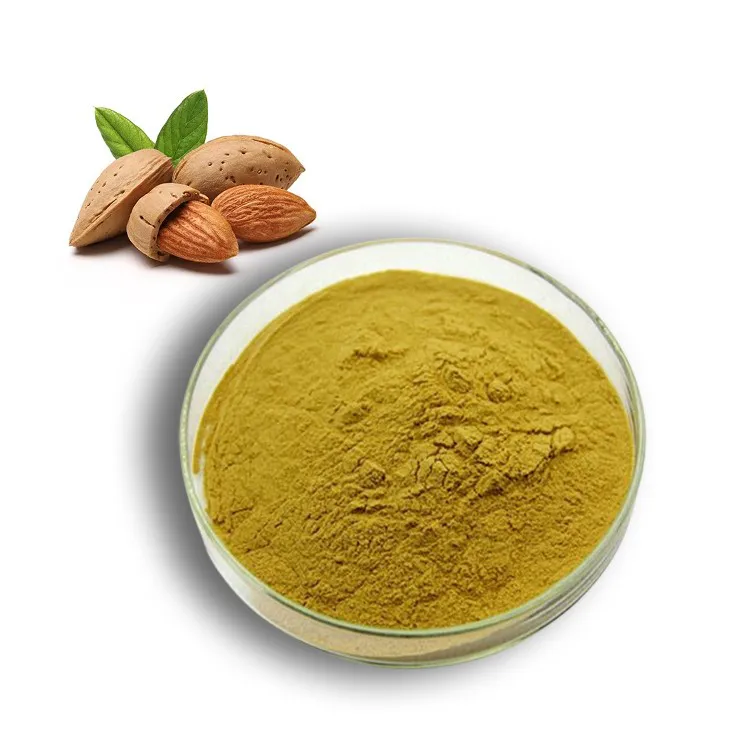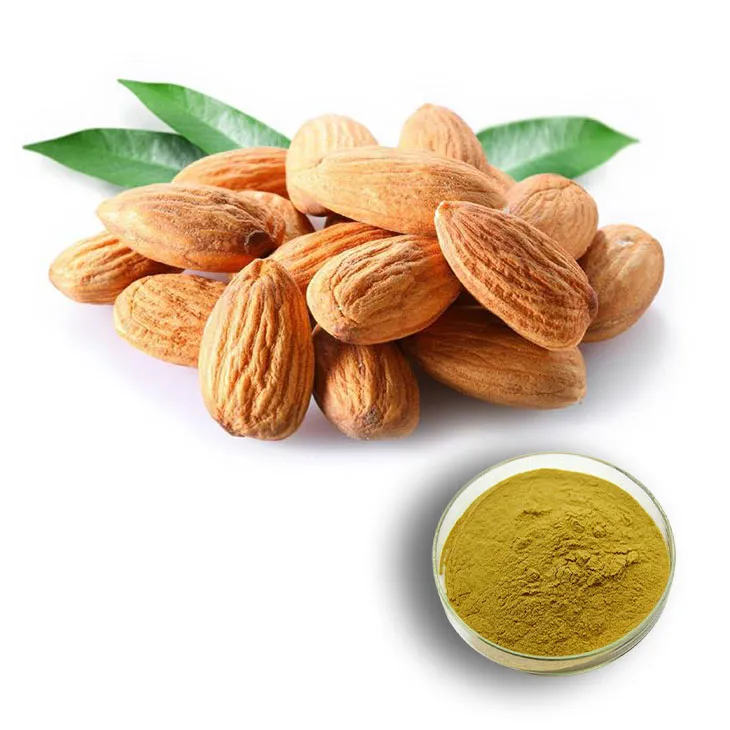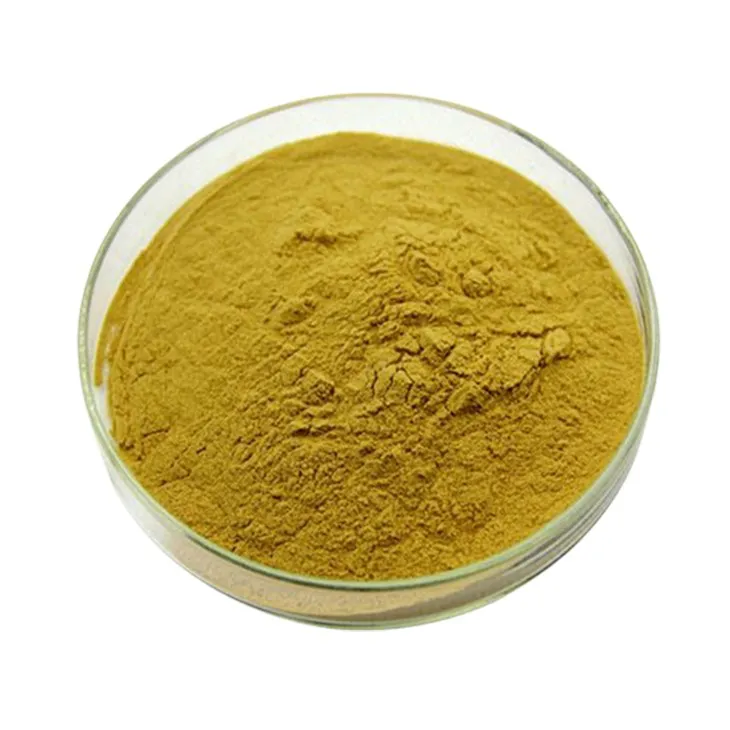- 0086-571-85302990
- sales@greenskybio.com
The flavor of ripe almonds and natural almond extract powder.
2024-11-12

1. Introduction
Almonds are a popular and versatile ingredient in various industries, including food, cosmetics, and traditional medicine. The flavor of ripe almonds and natural Almond Extract Powder are two important forms in which almond flavor is presented. Understanding their unique characteristics is essential for those who work in relevant fields or simply enjoy the taste of almonds. This article will conduct a comprehensive comparison between the two in terms of aroma profiles, production processes, and potential health impacts.

2. Aroma Profiles
2.1 Ripe Almond Flavor
The flavor of ripe almonds has a subtle yet distinct aroma. It is a complex blend of nutty, sweet, and slightly earthy notes. When you crack open a ripe almond shell and take a sniff, you can detect a warm, rich scent that is both inviting and comforting. This natural aroma is the result of the almonds' internal chemical composition, which includes various oils, proteins, and other organic compounds. The nutty aspect is predominant, giving it a characteristic that is instantly recognizable as an almond. The sweetness is not overpowering but rather a gentle undertone that complements the nuttiness, while the earthy note adds a depth and authenticity to the overall flavor profile.
2.2 Natural Almond Extract Powder
Natural Almond Extract Powder, on the other hand, has a more concentrated and intense aroma. Since it is an extract, it has been processed to capture and intensify the key flavor components of almonds. The powder form allows for a more potent release of the almond flavor. It has a strong, pure almond smell that can be quite pungent in a pleasant way. The extraction process often removes some of the more subtle background notes present in the whole ripe almond, leaving behind a more straightforward and powerful almond essence. This makes it a popular choice for applications where a strong almond flavor is desired without the use of a large quantity of whole almonds.

3. Production Processes
3.1 Production of Ripe Almonds
Ripe almonds are the result of a natural growth process. Almond trees are cultivated in suitable climates, typically in regions with warm, dry summers and mild winters. The almond tree produces blossoms, which are then pollinated. After pollination, the almond fruit begins to develop. As it matures, the outer hull turns from green to a yellow - brown color, indicating that the almond inside is ripe. Harvesting usually involves mechanical shaking of the trees to dislodge the almonds from their branches. Once harvested, the almonds are typically dried to reduce moisture content, which helps in preservation. This entire process is relatively straightforward and relies on the natural life cycle of the almond tree and basic post - harvest handling techniques.
3.2 Production of Natural Almond Extract Powder
The production of natural almond extract powder is a more complex process. First, ripe almonds are selected as the raw material. These almonds are then crushed or ground into a fine paste. The next step involves the extraction of the flavor compounds. This can be done through various methods, such as solvent extraction or steam distillation. In solvent extraction, a suitable solvent (often food - grade ethanol) is used to dissolve the flavor - containing substances from the almond paste. The solvent is then evaporated, leaving behind the concentrated flavor extract. In steam distillation, steam is passed through the almond paste, and the volatile flavor components are carried away with the steam. The steam is then condensed, and the resulting liquid contains the almond flavor extract. After extraction, the liquid extract is further processed to convert it into a powder form. This may involve techniques such as spray drying or freeze - drying, which remove the remaining moisture and transform the extract into a stable, powdered product.

4. Potential Health Impacts
4.1 Health Benefits of Ripe Almonds
Ripe almonds are a nutritional powerhouse. They are rich in healthy fats, particularly monounsaturated fats, which are beneficial for heart health. These fats can help lower bad cholesterol levels in the blood. Almonds also contain a significant amount of protein, making them a great plant - based source of this essential macronutrient. Additionally, they are a good source of dietary fiber, which aids in digestion and can help regulate blood sugar levels. Ripe almonds also contain various vitamins and minerals, such as vitamin E, magnesium, and potassium. Vitamin E is an antioxidant that helps protect cells from damage, while magnesium and potassium are important for proper muscle and nerve function.
- Rich in monounsaturated fats for heart health.
- Good source of protein for vegetarians and vegans.
- High in dietary fiber for digestion and blood sugar regulation.
- Contain vitamins and minerals like vitamin E, magnesium, and potassium.
4.2 Health Considerations of Natural Almond Extract Powder
While natural almond extract powder is derived from almonds, it is important to note that during the extraction process, some of the nutritional components may be lost or altered. However, it still retains some of the beneficial properties of almonds. For example, it may still contain trace amounts of vitamins and minerals. But because it is a concentrated form, it should be used in moderation, especially in products where it may be consumed in large quantities. Some people may also be allergic to almonds, and the extract powder can pose the same allergenic risk as whole almonds. It is crucial for manufacturers to clearly label products containing almond extract powder to ensure the safety of consumers with almond allergies.
- Some nutritional components may be lost during extraction.
- Should be used in moderation due to concentration.
- Allergenic risk for those allergic to almonds.

5. Applications in Baking
5.1 Ripe Almonds in Baking
Ripe almonds can be used in baking in various forms. They can be chopped or sliced and added directly to baked goods such as cakes, cookies, and bread. In these applications, they not only add their unique flavor but also provide a pleasant texture. The nutty crunch of almonds can enhance the overall eating experience of baked products. For example, in an almond - studded cake, the almonds add a depth of flavor and a bit of chewiness. They can also be ground into a fine meal and used as a substitute for some of the flour in gluten - free baking, adding both flavor and structure to the baked item.
- Added as chopped or sliced for flavor and texture.
- Ground into meal for gluten - free baking.
5.2 Almond Extract Powder in Baking
Almond extract powder is a popular choice in baking when a strong almond flavor is desired without the addition of a large amount of whole almonds. It can be easily incorporated into batters and doughs. A small amount of almond extract powder can impart a powerful almond flavor to cakes, cookies, and pastries. It is especially useful in making almond - flavored icings and fillings, where a concentrated flavor is needed. However, it is important to measure carefully when using the powder, as too much can overpower the other flavors in the baked good.
- Imparts strong flavor without using many whole almonds.
- Good for almond - flavored icings and fillings.
- Must be measured carefully to avoid overpowering other flavors.
6. Applications in Confectionery
6.1 Ripe Almonds in Confectionery
In confectionery, ripe almonds are a common ingredient. They can be used in the production of almond - based candies such as marzipan, which is made from ground almonds and sugar. The natural flavor and texture of almonds are key to the authenticity of these confections. Almonds can also be coated with chocolate or other sweet coatings to create delicious treats. The combination of the crunchy almond and the smooth coating provides a satisfying contrast in textures.
- Used in making marzipan.
- Coated with chocolate for treats.
6.2 Almond Extract Powder in Confectionery
Almond extract powder is often used in confectionery to enhance the almond flavor in products where a more intense flavor is desired. It can be added to gummies, hard candies, or other confections to give them an almond - scented twist. In some cases, it can be used in combination with whole almonds to create a more complex flavor profile. However, as with baking, care must be taken not to use too much of the extract powder, as it can make the confectionery taste overly artificial.
- Enhances almond flavor in gummies and hard candies.
- Can be combined with whole almonds for complex flavor.
- Must be used carefully to avoid artificial taste.
7. Applications in Natural Remedies
7.1 Ripe Almonds in Natural Remedies
In traditional medicine, ripe almonds have been used for various purposes. They are believed to have a moisturizing effect on the skin when applied topically in the form of almond oil, which is extracted from ripe almonds. Almonds are also thought to have a mild laxative effect when consumed in moderation, due to their fiber content. Additionally, the nutrients in ripe almonds, such as vitamin E, may contribute to overall skin health when consumed as part of a balanced diet.
- Almond oil from ripe almonds for skin moisturizing.
- Mild laxative effect due to fiber.
7.2 Almond Extract Powder in Natural Remedies
While there is less research on the use of almond extract powder in natural remedies compared to whole almonds, it may still potentially offer some benefits. Since it contains concentrated almond flavor, it could be used in aromatherapy - related applications, where the scent of almonds is believed to have a calming effect. However, it should be used with caution, especially in products that may be ingested, as the extraction process may have altered some of the natural properties of almonds.
- Potential use in aromatherapy for calming effect.
- Caution in ingestion - related products.
8. Conclusion
In conclusion, both the flavor of ripe almonds and natural almond extract powder have their own unique characteristics. The ripe almond flavor offers a more complex and natural aroma, while the almond extract powder provides a concentrated and intense flavor. Their production processes are quite different, with the latter being more complex. In terms of health impacts, ripe almonds are a nutritional powerhouse, while the extract powder has some considerations due to the extraction process. In various applications such as baking, confectionery, and natural remedies, they each have their own advantages and can be used in different ways to achieve the desired results. Understanding these differences is crucial for making informed decisions in both the production and consumption of almond - flavored products.
FAQ:
Question 1: What are the main differences in aroma profiles between ripe almonds and natural almond extract powder?
The aroma of ripe almonds is more natural and mellow, with a subtle, nutty fragrance. It has a complex profile that includes earthy and sweet undertones. Natural almond extract powder, on the other hand, has a more concentrated and intense aroma. It is often processed to preserve and intensify the characteristic almond scent, which can be more pungent and have a stronger almond - like" smell compared to the natural, whole - ripe almond.
Question 2: How are ripe almonds and natural almond extract powder produced?
Ripe almonds are the result of almond trees going through a growth cycle. Almonds are harvested when they reach maturity. The production process involves growing almond trees, pollination, and proper harvesting techniques. Natural almond extract powder is produced by extracting the flavor compounds from almonds. This is typically done through a process of distillation or solvent extraction. The resulting extract is then dried to form a powder, which concentrates the flavor.
Question 3: Can ripe almonds and natural almond extract powder be used interchangeably in baking?
They can be used somewhat interchangeably in baking, but with some considerations. Ripe almonds can add a natural texture as well as flavor. For example, chopped ripe almonds can give a crunch to baked goods. Natural almond extract powder, due to its concentrated flavor, is often used in smaller quantities. If using the powder instead of ripe almonds, it may not provide the same textural element. However, if you want a strong almond flavor without the added texture, the powder can be a good substitute, but the amount needs to be adjusted carefully.
Question 4: Are there any health benefits associated with ripe almonds and natural almond extract powder?
Ripe almonds are a nutritious food. They are a good source of healthy fats, protein, fiber, vitamins, and minerals. Consuming ripe almonds can contribute to heart health, help with weight management, and provide essential nutrients. Natural almond extract powder, while it contains some of the flavor - related compounds from almonds, is not a significant source of these nutrients as it is used in very small quantities for flavoring. However, some of the compounds in almond extract may have antioxidant properties, but it is not a substitute for consuming whole almonds for health benefits.
Question 5: How should natural almond extract powder be stored to maintain its flavor?
Natural almond extract powder should be stored in a cool, dry place, away from direct sunlight. It is best to keep it in an airtight container to prevent exposure to air and moisture, which can cause the flavor to degrade over time. Storing it in the pantry away from heat - producing appliances is a good option. If stored properly, it can maintain its potent almond flavor for an extended period.
Related literature
- "The Almond: Botany, Production and Uses"
- "Flavor Chemistry of Almonds and Almond - Based Products"
- "Health Benefits of Almond Consumption: A Review"
- ▶ Hesperidin
- ▶ citrus bioflavonoids
- ▶ plant extract
- ▶ lycopene
- ▶ Diosmin
- ▶ Grape seed extract
- ▶ Sea buckthorn Juice Powder
- ▶ Beetroot powder
- ▶ Hops Extract
- ▶ Artichoke Extract
- ▶ Reishi mushroom extract
- ▶ Astaxanthin
- ▶ Green Tea Extract
- ▶ Curcumin Extract
- ▶ Horse Chestnut Extract
- ▶ Other Problems
- ▶ Boswellia Serrata Extract
- ▶ Resveratrol Extract
- ▶ Marigold Extract
- ▶ Grape Leaf Extract
- ▶ blog3
-
High purity olive leaf extract
2024-11-12
-
Lavender oil extraction method
2024-11-12
-
100% organic virgin sea buckthorn fruit oil
2024-11-12
-
Lotus leaf extract powder factory in China
2024-11-12
-
China aged garlic extract supplier
2024-11-12
-
Deer antler extract powder manufacturer
2024-11-12
-
Saw palmetto extract vs whole herb
2024-11-12
-
Kidney Bean Extract
2024-11-12
-
Curcuma Longa Extract/Turmeric extract
2024-11-12
-
Hesperidin
2024-11-12
-
Bamboo Leaf extract
2024-11-12
-
Konjac Powder
2024-11-12
-
Okra Extract
2024-11-12
-
Troxerutin
2024-11-12
-
Stevia Extract
2024-11-12
-
Boswellia Serrata Extract
2024-11-12
-
Sea buckthorn Juice Powder
2024-11-12





















